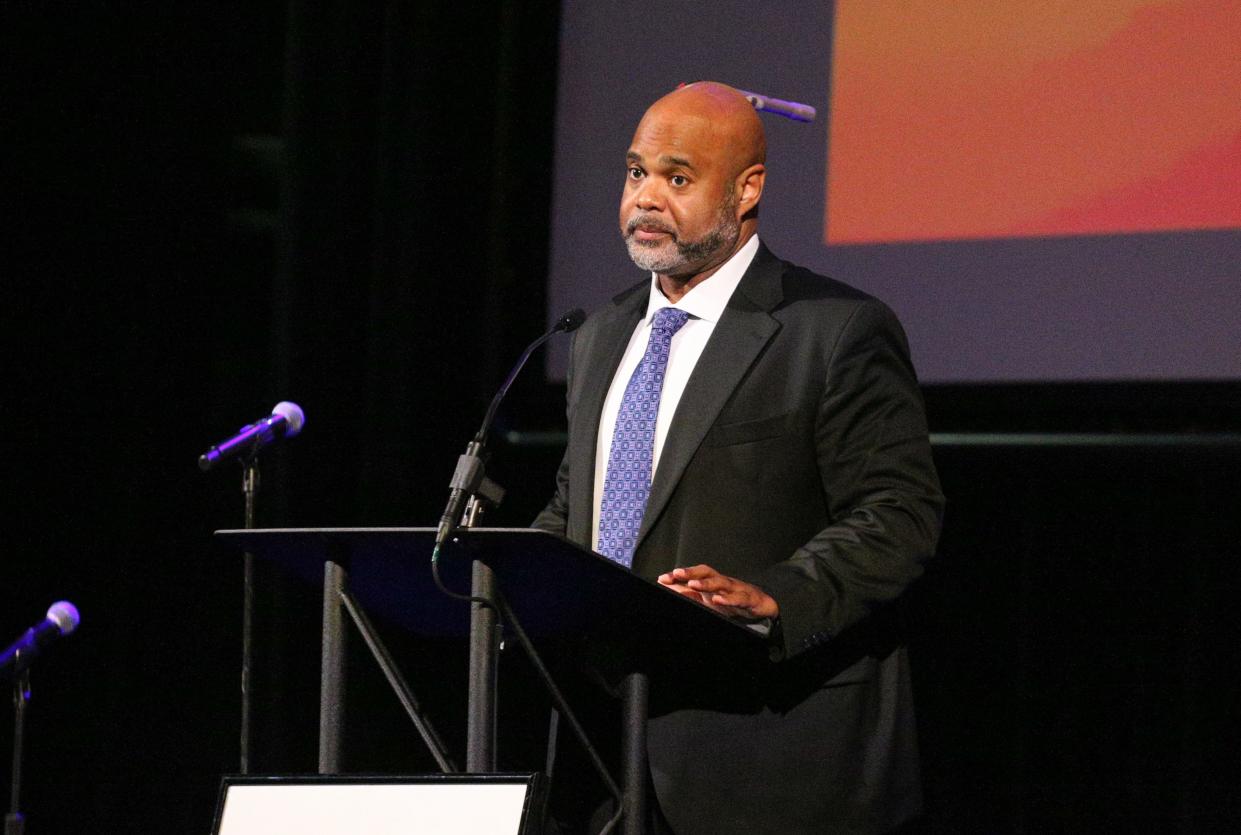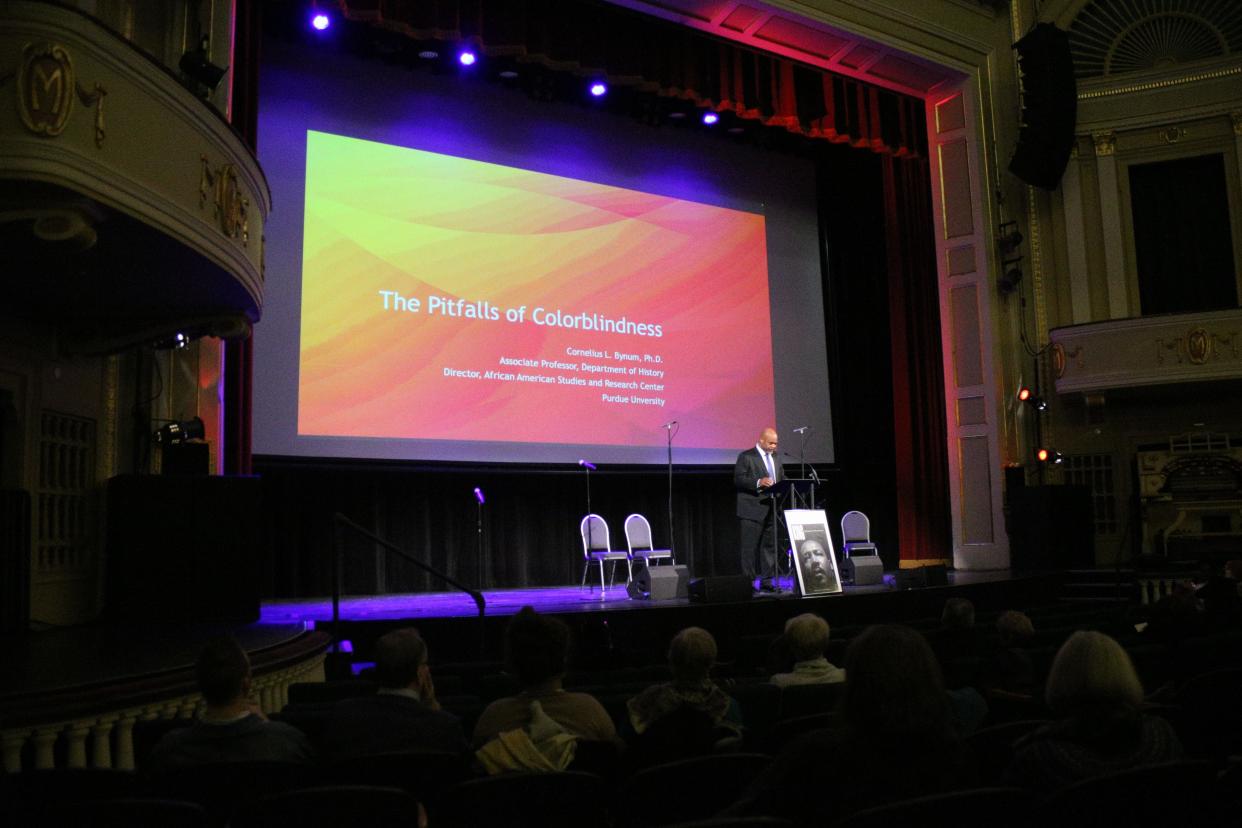MLK Keynote speaker discusses the 'pitfall of colorblindness' and the need for change
LAFAYETTE, Ind. — A little more than 60 years ago, the Rev. Martin Luther King Jr. delivered his most influential “I Have a Dream” speech, which swayed the collective mind of the nation in the fight for civil rights.
The ideals that King spoke about in that speech have become a lesson that many attempt to follow in their daily lives and when creating public policies.
“I have a dream that my four little children will one day live in a nation where they will not be judged by the color of their skin but by the content of their character. I have a dream today” King said in his 1963 speech.
The ideals in this speech became the focus of this year's Martin Luther King Jr. Day celebration event hosted by the Tippecanoe County Public Library at the Long Center of Performing Arts in downtown Lafayette.
Every year, Jos Holman, the director of the Tippecanoe County Public Library, invites a local person to be the keynote speaker, with the goal of potentially challenging those in attendance as they reflect on the legacy of Martin Luther King Jr.
This year's event saw about 130 people traverse the single-digit weather to celebrate King's legacy.
Cornelius Bynum, associate professor and director of African American Studies at Purdue University, delivered this year's address. He expressed his criticism of how King’s ideals presented in his speech have been misconstrued over the years.

“As a historian and as an educator, I often find myself deeply upset by how badly people misunderstand Martin Luther King Jr. and his place in the modern Civil Rights Movement,” Bynum said.
“This content of their character line has become the basis for theories of color blind and race-neutral policy discourse, that deviously King’s intent.
“Rather than focusing on notions of justice and freedom than anger or hate in the dictates of Christ.
“Proponents of colorblindness have misappropriated his words to condemn public policies like affirmative action as immoral or unconstitutional.”
In hopes of addressing this misappropriation, Bynum used his time at this year’s event to highlight the “pitfalls of colorblindness,” and in turn, have the audience reflect on the words King spoke in 1963.
“King was a radical theologian who attempted to press the nation to act on basic Christian principles outlined in the New Testament,” he said.
The core of King’s philosophy is based on the idea of the “Golden Rule," which Bynum quoted from Matthew: “Whatsoever you have done to at least one of my brethren, you have also done to me."
“As a nation, we have never met this state of basic decency and respect to Black Americans or people of color,” Bynum said.
King never intended to foster this theory of “colorblindness” with the words in his speech and how this idea is detrimental to the goals of the Civil Rights Act, Bynum said.
“The pitfalls or traps of colorblindness lay in ideas, theories, or policies that report to seek justice while purposely ignoring the structures and the consequences of racial discrimination,” he said. “Indeed, colorblind discourse offers nothing of substance to address the discrimination and injustice that King discusses in his speech.
“On the one hand, colorblindness restricts our ability to see problems of race clearly," he said. "It suggests that negative outcomes that people of color experience are individual and not a result of the system.”
Bynum noted that policies that are made with this lens of colorblindness, fail to address issues within the system that typically affect minority communities negatively and disproportionately when compared to their white neighbors.
He showcased three major stories from the New York Times which highlighted racial discrimination within housing, policies and health care in 2024.
“Colorblind discourse is also problematic on the solutions because it precludes honest examination of structures that create and maintain a certain issues,” he said.

He noted how in 2021 the Centers for Disease Control and Prevention released its maternal mortality rate report, and it highlighted how the maternal mortality rate for non-Hispanic Black women was 2.6 times higher than for non-Hispanic white women.
“The discourse of colorblindness offers nothing for inherently racial problems like this one," Bynum said. "It precludes that developing programs to improve and advance Black doctors. It precludes mandate-specific training for appropriate care for Black maternity patients, not colorblindness.
“These ideas that would not have a targeted program specifically targeted to address inherently racial problems, isn’t captured in a colorblind discourse," he said.
“An insistence on colorblind solutions to systemic racism always falls short because such solutions do not have the capacity to evaluate structural assertions honestly.”
Bynum believes that these ideas of colorblind solutions are deliberately designed to “absolve society from any responsibility to make substantive change.”
“If the problems we face are not inherently racial as colorblind discourses insist and race-neutral solutions fail to resolve anything, then what is society doing? What are we to do?”
The ideas of colorblind solutions disincentives people who want to create meaningful change by actively addressing the issues of society.
Proponents of and policies of race-neutral solutions are able to absolve themselves of guilt, “by insisting that they’ve done everything they possibly and the rest can bury their heads into the sand like an ostrich, claiming that racism no longer exists.”
“These are the pitfalls of colorblindness,” Bynum said.
As for the issues of colorblindness solutions, Bynum acknowledged, there's not an easy solution to this problem, and how it has been a question that this nation has been trying to solve since its birth.
But in order to find a real solution to these issues, Bynum notes that people need to first be self-reflective on the system the country currently has in place and acknowledge the need to change in this country.
Noe Padilla is a reporter for the Journal & Courier. Email him at Npadilla@jconline.com and follow him on Twitter at 1NoePadilla.
This article originally appeared on Lafayette Journal & Courier: MLK Keynote speaker talks about the 'pitfall of colorblindness'
